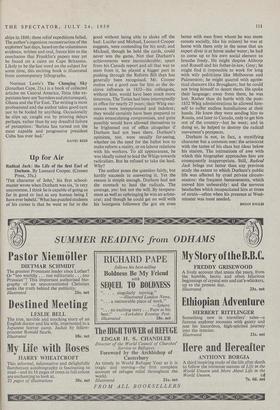Up for Air
'The character of John,' his first school- master wrote when Durham was six, 'is very uncommon. I think he is capable of going as far in good or bad as any human being I have ever beheld.' What has puzzled students of his career is that he went so far in the good without being able to shake off the bad: Lucifer and Michael, Leonard Cooper suggests, were contending for his soul; and Michael, though he held the cards, could never win the game. Not that Durham's achievements were inconsiderable; apart from his Canada report and all that was to stem from it, he played a bigger part in pushing through the Reform Bill than has generally been recognised. Mr. Cooper makes out a good case for him as the de- cisive influence in 1832—his colleagues, without him, would have been much more timorous. The Tories had been interruptedly in office for nearly 25 years; their Whig suc- cessors were inexperienced and indolent; they would certainly have been prepared to make emasculating compromises, and quite possibly would have allowed themselves to be frightened out of office altogether if Durham had not been there. Durham's opinions, too, were usually far-seeing, whether on the need for the ballot box to make reform a reality, or on labour relations with his workers. To all appearances, he was ideally suited to lead the Whigs towards radicalism. But he refused to take the lead. Why?
The author poses the question fairly, but hardly succeeds in answering it. Yet the reason is simple enough. Durham had not the stomach to lead the radicals. The courage, yes: but not the will. By tempera- ment as well as upbringing he was an aristo- crat; and though he could get on well with his bourgeois followers (he got on even better with men from whom he was more remote socially, like his miners) he was at home with them only in the sense that an expert diver is at home under water; he had to come up to his own social element to breathe freely. He might despise Althorn and Russell and his father-in-law, Grey; he might find it impossible to work for long with wily politicians like Melbourne and Palmerston; he might quarrel with egotis- tical chancers like Brougham; but he could not bring himself to desert them. He spoke their language; away from them, he was lost. Rather than do battle with the post- 1832 Whig administrations he allowed him- self to suffer endless humiliations at their hands. He knew they were sending him to Russia, and later to Canada, only to get him out of the country—but he went; and in doing so, he helped to destroy the radical movement's prospects.
Durham is not, in fact, a mystifying character but a common one: the aristocrat with the tastes of his class but ideas below his station. The intimations of awe with which this biographer approaches him are consequently inappropriate. Still, Radical Jack brings out better than any previous study the extent to which Durham's public life was affected by cruel private circum- stances: the frequent bereavements, which moved him unbearably: and the nervous headaches which incapacitated him at times of strain—often when his presence at West- minster was most needed.
BRIAN INGLIS






































 Previous page
Previous page